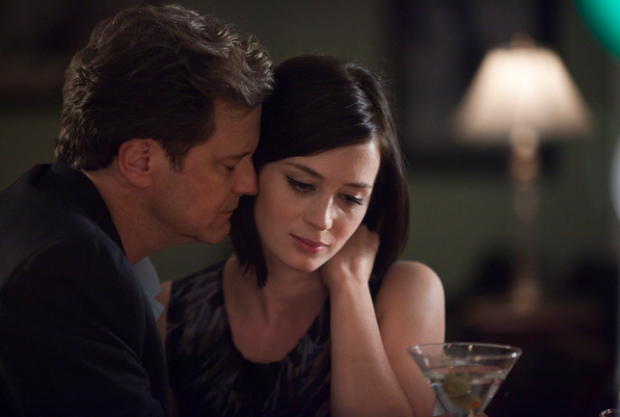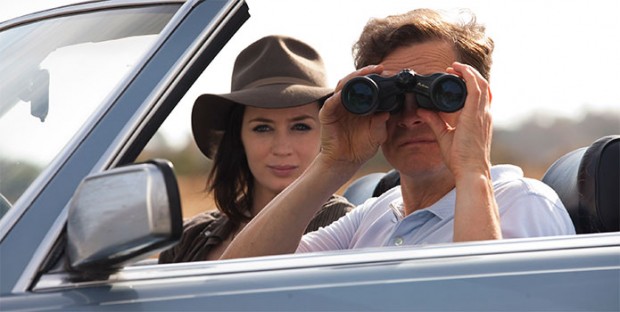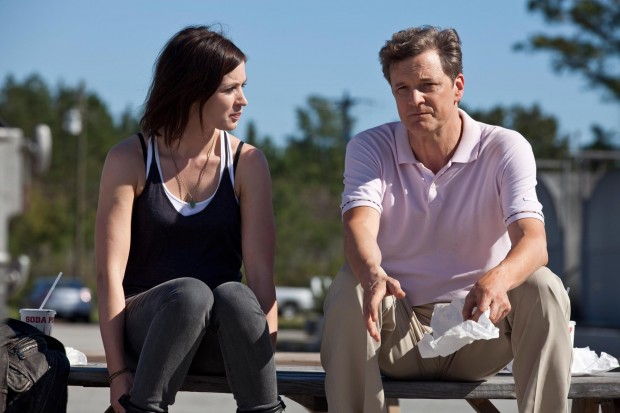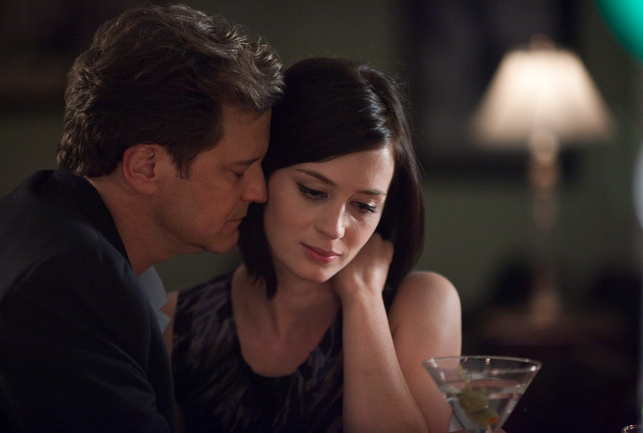
A quality drama can often leave you in unexpected places, and in this regard, Arthur Newman absolutely succeeds. Bolstered by strong performances from Emily Blunt and Colin Firth, the film follows two pretenders on a journey of discovery. This, surprisingly, is director Dante Ariola’s first feature and he allows the character’s journeys to breathe with both quiet confidence and a handle on the comedy within. Set for a theatrical release beginning today, I was able to get on the phone with Dante to discuss how he found the balance of making Blunt crack herself up but not the audience, accents, mystique in the film, and much more.
With their heavy British accents (to the point that Blunt said the word “condom” funny on the set of 5 Year Engagement and had to be told how they wanted her to pronounce it), I was curious if he had any odd instances of getting his two British actors in American roles to pronounce things a certain way himself. Fortunately, it was smooth sailing for the director. “The accents haven’t really been an issue,” Ariola said in regards to how people perceive the film. “[Emily’s] such a chameleon, especially early in her career. I think she’s pretty good at doing an accent and we had a good dialect coach come on early. I think it was more difficult with Colin [Firth], not because of his accent but just the audience’s baggage of knowing, ‘This is Colin Firth.'”
When I mention that it is interesting that he cast two British people in these two small town America roles, Ariola laughed and simply acknowledged that was true: “Yeah, it is very counterintuitive.” He added that while reading the script, he noticed that the character of Arthur Newman was “a pretty flawed guy” and that there were a number of unlikable things about him. So, when he was thinking of who to cast, that actor had to have an “inherent, empathetic quality that would allow the audience to go on a journey with this flawed guy.” That’s when Colin Firth “popped into my head”, the director told me. He also noted that Firth spent some time growing up in St. Louis, so he had been exposed to the American lifestyle and language early on.
As for Emily, he really liked the “chameleon” quality of her acting and how Blunt really does blend into a film. He also touched upon the fact that their age difference in real life works in the film’s reality. “It’s another thing that makes these two characters completely mismatched in every way yet they’re having this experience together,” Ariola said. “But it didn’t become a film about an older man and a younger woman. And they had some inherent chemistry when they met each other.”
Lately Emily has shown off her comedic sensibilities and there are some moments in the film when she, being a naturally funny woman, could take a joke during a dark moment and actually make it funny. Yet, there is one moment in particular where her character cracks a joke and laughs about it with herself but as an audience we don’t laugh. It’s not amusing. So I asked him how much he was aware of that scene. “It’s interesting you bring up that moment,” Ariola said. “I’d say there are a lot of pretty emotional scenes in the film, and then there’s some things that are awkwardly funny without being a gag. But that is one of the few scenes where the idea was to really keep the audience in Arthur’s perspective, like, ‘Who is this girl? How crazy is she, really?’ And I thought that scene was a useful tool.”

He further explored it, saying, “that kind of laughing and the sing-songy thing was one of the few things I said, ‘This would be really nice to bracket this and start really small and take this further where it’s making me uncomfortable and we’ll figure it out in the edit what shade of grey it needs to be.’ That was one of the trickier ones to modulate. From my point of view, it was one of the few ones where I thought that I would have to see where it fit together in the overall mosaic.”
There’s also a certain level of mystique in the film, something he admits was part of the draw to the script by Becky Johnston. “It’s one of those films where it doesn’t explain everything away,” Ariola told me. “I’m a big fan of ‘show me, don’t tell me’. So there’s something about seeing him sitting there [in the employment office] where you kind of know the guy does not look so happy.” He also admits that the film is “a slower burn than a lot of films nowadays” but that it’s pacing is to continue the mystery. “Another piece of the puzzle is always connecting and filled in as the film progresses.”
Trust is a big issue in the film, particularly with how Arthur and Mike’s relationship intertwines. There’s a constant dance of trust where they get close and then pull apart. “There’s definitely a theme of identity running through the film,” Ariola said, “and as the film goes both characters start to reveal, literally, their other names to each other and other aspects of who they really are. I think escapism can be really enjoyable and people do that in a lot of different ways.”
I also asked Ariola what he looks for in films himself and whether he takes any impressions into a film. “I think some of my favorite film experiences are walking into the theater and not knowing anything about the film you’re about to see,” Ariola revealed. “I’m not sure exactly what the expectation of a film would be with this cast. This film, maybe more than some, is more of a mirror. Your reaction to it is where you are at in your own life at the time you see it. I try to have no expectations on a film. I try to never watch a film as a director. Just as an audience member.”
I mention that in relation to going into a film blind, a lot of cinemagoers respond to casting and in particular people they recognize. With Emily Blunt and Colin Firth headlining, it’s a much easier sell. They don’t need to watch a trailer. They like these actors. So I asked about how the trailer for this film came about and how much he was aware of that. “I think it’s a fair representation of the story. It’s a little bit tonally different, but I think it gives an overview of what you’re going to see in the film.” However, he warned that the film may be out of the “wheelhouse” of certain Colin Firth fans. The film is very dark in many ways, and the humor is often understated or awkward and you don’t really get that impression from the trailer, which I think is what Ariola was talking about when he said it is tonally different.
“But I think at the end of the day, this story stands on its own merits,” Ariola added. “I think Colin, in particular, wants to make movies that speak to him. I think he’s earned that. For his fans, it’s still Colin Firth. He’s not playing a serial killer. But it’s definitely not Bridget Jones’s Diary. Not to malign that, but it’s more of apples and oranges.”
I also asked about the extensive use of ambient and natural lighting throughout the film, which Ariola described as his “aesthetic” and went into his goal of the collaboration with cinematographer Eduard Grau. “It was supposed to not look too polished and I was just trying to capture the tone of each scene,” Ariola explained. “It wasn’t an intellectual decision. I wanted it to look a certain way. The foliated trees have the right tone to look at banal imagery and try to bring strange beauty to it.”
Arthur Newman hits theaters today. Check out the first ten minutes of the film below.


